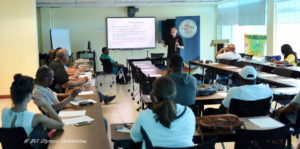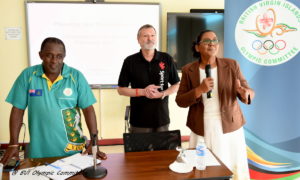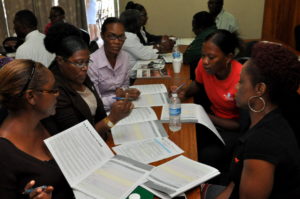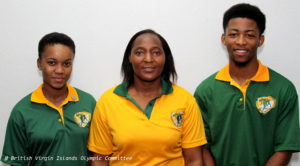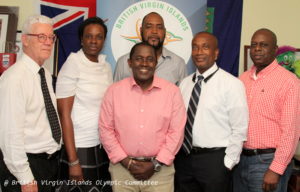By BVI Athletics Association
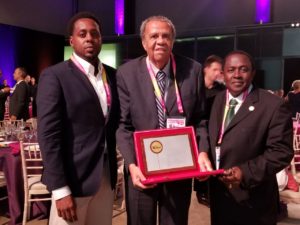
Rey O’Neal, OBE recipient of the “IAAF Plaque of Merit” is
flanked by BVIAA President Steve Augustine (L) and BVIOC President Ephraim Penn at the 51st IAAF Congress. Photo: BVIAA
Mr. Reynold ‘Rey’ O’Neal, OBE received an extraordinary honour from Lord Sebastian Coe, President of the International Association of Athletics Federations (IAAF) at the opening ceremony of the 51st IAAF Congress.
The “IAAF Plaque of Merit”, awarded for meritorious services to World Athletics,” was presented to Rey in recognition of his 40-plus years of service to the world of track and field, particularly in the North America, Central America and Caribbean region (NACAC). Mr. O’Neal has made enormous contributions to the success and the development of the sport of Track and Field. The recipients for each IAAF area included:
AAA – Fumihiro Yamasawa (JPN)
CAA – Aleck Skhosana (RSA)
CONSUDATLE – Wilfredys Leon (VEN)
EA – Clemens Prokop (GER)
NACAC – Reynold O’Neal (IVB)
OAA – Fletcher McEwen (AUS)
O’Neal was one of the founding members of the BVI Amateur Athletic Association (BVIAAA), in 1970 and became President later that year, a stint that lasted until 1973. In 1978, he assumed the office once more and retained the position until 2004 when he stepped down in favor of his protégé, Ephraim Penn,
In 1975, Rey O’Neal, along with Johnny Hassan led the first British Virgin Islands to compete in the Central American and Caribbean (CAC) Athletics Championships, held that year in Ponce, Puerto Rico.
The BVIAAA then gained international recognition as a member of the IAAF. At that time, except for softball, there were no other national sporting associations /federations affiliated to their international governing bodies.
Over the years, Mr. O’Neal held several positions in track and field, first as a member of the CAC Technical Committee and for several years as a member and then chairman of the CAC Statistics Committee. Additionally, as a member of the IAAF Statisticians, O’Neal often functioned as a resource person for several regional Federations and helped to select the teams that would represent the Americas at the IAAF World Cup. He became the Vice-President of North America, Central America and the Caribbean (NACAC) Athletic Association in 1997 and held the position until he resigned in 2003.
O’Neal also served as a member of the Central American and Caribbean Athletic Association Confederation (CACAC) Executive Committee for 19 years. He was chosen to lead the Organisation of Eastern Caribbean States (OECS) Athletics Commission in 1991. In 2003, O’Neal was awarded the IAAF Veteran’s Pin and the following year was named to the CAC Hall of Fame.
Steve Augustine, President of the BVI Athletics Association (BVIAA) along with Mr. Ephraim Penn, President of the BVI Olympic Committee and other BVIAA executive members were privileged to share in this occasion with Mr. O’Neal.
“Given Mr. O’Neal’s many years of dedicated service to the sport of athletics, locally, regionally and internationally, I wholeheartedly join with the IAAF in recognizing his contributions on this grand-world-stage, who without debate, is truly deserving of this prestigious international award,” commented President Augustine. “The BVIAA and wider athletics family is blessed to have Rey as a stalwart in our midst,” he added.
The BVIAA executive board, members, athletes and Track and Field family congratulate Mr. O’Neal on this lifetime achievement award.
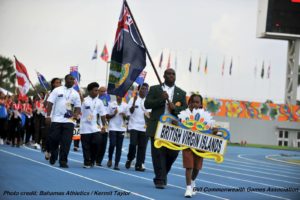
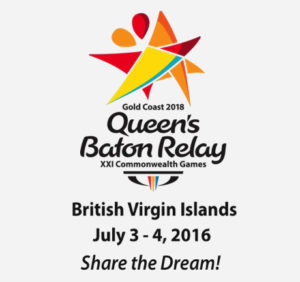
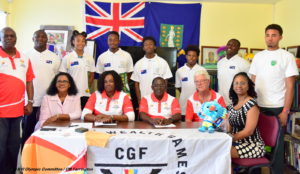
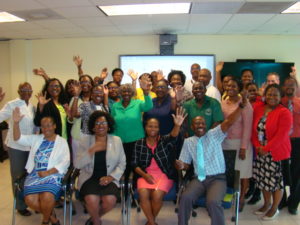
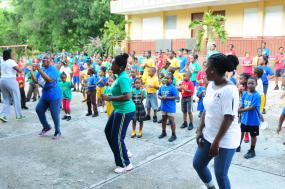
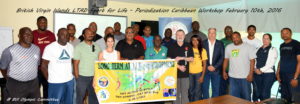 The BVI Olympic Committee (BVIOC) in partnership with the Caribbean Association of National Olympic Committees (CANOC), Canada Sport for Life Society (CS4L), Canada Olympic Committee (COC) and Olympic Solidarity hosted the 4th Workshop on Long Term Athlete Development with emphasis on Periodization and Planning.
The BVI Olympic Committee (BVIOC) in partnership with the Caribbean Association of National Olympic Committees (CANOC), Canada Sport for Life Society (CS4L), Canada Olympic Committee (COC) and Olympic Solidarity hosted the 4th Workshop on Long Term Athlete Development with emphasis on Periodization and Planning.